In this post I’m going to list high calorie vegan foods for weight gain.
With meat and dairy high on the list of calorie rich food, it can be quite a tricky task for those vegans wishing to gain or maintain their weight to find adequate replacements.
This article covers the best sources of vegan calories, some additional nutritional information and the odd tip on how to fit them into your diet
Do bear in mind, figures for calories per 100g do vary between the same kinds of food, so take the number stated as being within that region.
So if you’re asking “What are some vegan foods that help to increase weight?” then those on this list are essential additions to the vegan weight gain diet. Let’s kick off with probably the most obvious of high calorie vegan foods …
_________________________________________________
1. Nuts and Nut Butters
Vegans can find it difficult to find a snack food on a plant-based diet which is both high in calories and healthy.

“If someone mentions nuts again…” you might say, but it’s true, nuts tick both these boxes, plus they come in a variety of tastes, shapes and sizes (although they’re still all pretty small). In fact, nuts may be one of the best high fat vegan foods with one renowned study showing that under consumption of nuts and seeds was the third-leading diet based risk factor for death and disability in the world.
Another study suggests that although high in calories, nut fat may actually not lead to expected weight gain- a bonus for athletes but food for thought if adding a few pounds is the priority though…
Tip #1: Add nut butters to homemade shakes or cereals for a calorie boost. Healthier varieties are salt-free.
Tip #2: Consider walnuts as your first choice with their higher anti-oxidant content and Omega-3 levels.
Tip #3: Pair nuts with greens to increase absorption of nutrients.
Calories per 100g:
| Almonds | 579 |
| Almond Butter | 614 |
| Peanuts | 567 |
| Peanut Butter Smooth/Chunky | 598/589 |
| Walnuts | 654 |
| Brazil | 659 |
| Hazelnuts | 629 |
| Pecans | 691 |
| Cashews | 552 |
__________________
2. Tahini
Avocados and nuts can help bolster the calorie content of a salad, but what about the dressing? This is where Tahini comes in.
No, you may not have heard of it either, but tahini is basically a paste made from ground sesame seeds (consider it the sesame seed equivalent of a nut butter). It makes for an excellent, tasty dressing and also a sauce component for stir fries.
You may be asking “as a vegan how can I get enough healthy fat?” Well, alongside the likes of avocados and nuts, tahini can provide those healthy fats that also aid nutrient absorption.
Calories per 100g:
| Tahini | 595 |
________________________
3. Avocados
Most fruit and vegetables cannot be considered high calorie vegan foods.
A diet rich in fruit and veg obviously has huge nutritional benefits, but can leave you feeling unsatisfied if not eaten in sufficient quantities or paired with suitably calorific partners.
And anyway, who wants to spend all day peeling and chewing?
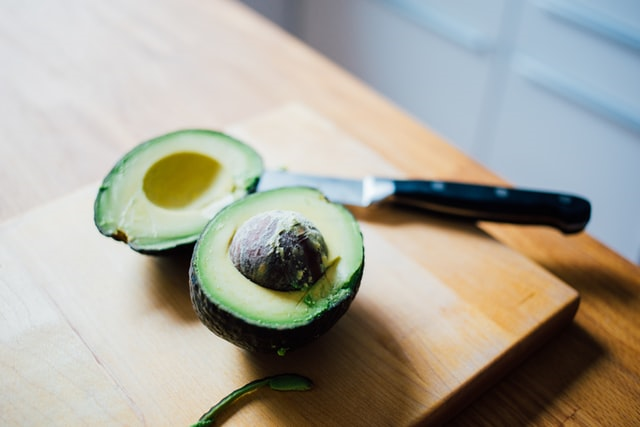
Adding an avocado to a salad or sandwich can help fill you up that bit more.
Not only that, studies show that the ‘good’ fats provided by high calorie vegan foods like nuts and avocados aid absorption of fat soluble vitamins and nutrients from the rest of the meal. Bonus.
Tip: Make your own guacamole for a healthy, high calorie vegan dip.
Calories per 100g:
| Avocado | 160 |
__________________________________________________
4. Extra Virgin Olive Oil
Oils should be avoided really, even by those seeking to gain weight as a vegan, however if it’s essential to a recipe or you just can’t go without, then extra virgin olive oil may be one of the better options.
Oils are calorie dense but lack significant nutrients and can impact negatively on arterial function and blood flow.
Additionally, deep frying foods in oil leads to the production of carcinogenic compounds. Not good.
Extra virgin olive oil as part of a high fruit and vegetable diet (as found in the Mediterranean for example) can provide extra calories with the fruit and vegetables helping to reduce the negative effects. And it’s better than butter.
However, did you know you can fry with water?
Calories per 100g:
| Extra Virgin Olive Oil (100mls) | 884 |
______________
5. Oats
Sausages, bacon and eggs may have been the breakfast foods of choice for those seeking a high calorie start to the day. Not only are these detrimental to health (and to the animals that provide them) but they are no longer available on the vegan menu.

Oats may not be packed with as many calories as these animal products, but being whole grains, are vastly healthier and will fill that hunger hole.
They have anti-inflammatory and anti-oxidant properties that can aid arterial function. The soluble fibre in them gives a sense of feeling full, so ironically may actually help with weight loss. The closer the oat type is to its original form, the better for health- with whole oat groats being the best of all.
Tip: Use oats instead of flour for a healthier more satisfying crumble dessert topping. Also add to ‘shakes to ‘bulk them up’.
Calories per 100g:
| Porridge Oats | 380 |
| Rolled Oats | 381 |
____________________
6. Quinoa
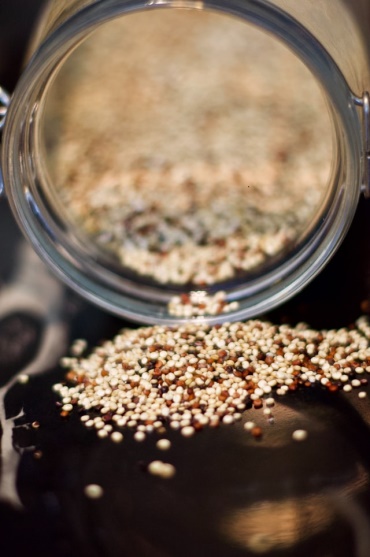
Grains should be the staple of any diet, but for those vegans wanting to maintain or gain weight, it might be beneficial to know which grains contain the most calories.
Quinoa (apparently it’s not a true grain- more a seed-like fruit) is a relatively modern addition to the diet of those living north of the equator but might be one of the most desirable. It is high in protein and a good source of folates and Vitamin E, and when consumed regularly has been shown to reduce triglyceride levels (high levels are a risk factor for heart disease) by over a third.
Tip: Quinoa doesn’t do so well when it comes to fibre content, so vary the grains you consume.
Calories per 100g:
| Quinoa (uncooked) | 368 |
| Quinoa (cooked) | 120 |
______________
7. Rice
Some grains, which should act as the backbone for a healthy vegan diet, may be harder to find, but rice does not fall into this category.
You can even make a dessert out of it…. yes… rice pudding.
Plentiful, cheap and satisfying, this high calorie food is a staple the world over.
Coloured, whole grains should be sought due to their higher anti-oxidant content alongside anti-allergy and anti-cancer effects.
Tip: There is some concern regarding arsenic content in rice so if possible opt for other whole grains. However, soaking, rinsing and cooking in high volumes of water can go some way to reducing arsenic levels.
Calories per 100g:
| White Rice (cooked) | 131 |
| White Rice (dried) | 412 |
| Brown Rice (dried) | 332 |
| Basmati (white, dried) | 350 |
| Basmati (brown, dried) | 350 |
| Wild (dried) | 342 |
| Long Grain (white, dried) | 354 |
| Arborio (white, dried) | 354 |
___________________________________________
8. Noodles and Pasta
Sometimes you just want to come home and have a hot meal that’s quick to put together and provides a decent number of calories.
Fry in the pan or just add water, pasta and noodle dishes can be as complex or simple as you choose as well as satisfying and able to provide a vegan with that calorie hit.
Use whole-wheat varieties for a healthier alternative alongside a mountain of veg and add sauces for extra flavour and more calories- such as Tahini, which you may remember from earlier…
Calories per 100g:
| Wholewheat Pasta (cooked) | 135 |
| White Pasta (cooked) | 141 |
| Soba/Buckwheat Noodles (cooked) | 99 |
| Rice Noodles (cooked) | 108 |
| Udon Noodles (ready to use) | 177 |
| Somen Noodles (cooked) | 99 |
_______________________________________________
9. Breads and Tortillas
When wanting a quick bite to eat that ‘fills a hole’ as it were, especially if on the go, then breads and wraps are an obvious choice.
With a myriad of fillings available (although shop bought offerings still need to catch-up) sandwiches and wraps can be a good portable, high calorie vegan choice. Higher fibre breads, that is, those rich in whole-wheats are the healthier option.
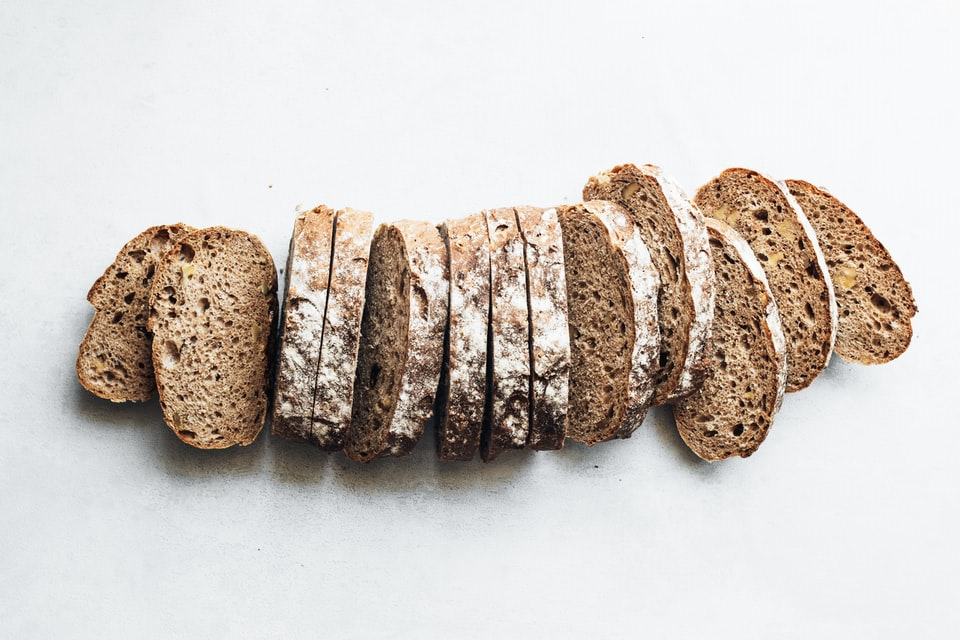
Photo by Louise Lyshøj on Unsplash
There are better whole-grain choices health wise as multiple slices of bread per day will soon take you over the recommended daily allowance for salt, but clearly, if out and about, then a bowl of oats and fruit is not going to be so practical.
Of course, bread and tortillas can be toasted adding extra variety and some can even be used as a base for homemade pizzas.
Calories per 100g:
| Tortilla Wrap (white) | 284 |
| Tortilla Wrap (wholemeal) | 202 |
| Wheat | 274 |
| Wholewheat | 252 |
| Seeded | 270 |
| Malted or Granary | 236 |
| Rye | 260 |
| Pita (wholewheat) | 262 |
| Sourdough | 269 |
__________________________
10. Legumes
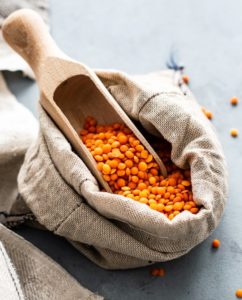
Healthy and high calorie vegan foods can be hard to find, particularly those that are rich in other essential nutrients, are substantial enough to leave you feeling satisfied after a meal, and are versatile enough to feature in numerous dishes.
Legumes, that is, lentils, chickpeas, beans and split peas should be the number one food to consider when looking to fulfil these criteria.
High in and an excellent source of vegan protein, iron and zinc plus fibre, legumes are also low in saturated fat and sodium.
They come in a variety of sources including the classic British baked bean, Indian daal, and the chili of Mexico. They can also be made into a high calorie, healthy dip (think Hummus).
Legumes are so instrumental to human health, that the American Institute for Cancer Research recommends they feature in EVERY MEAL. With the ability to regulate blood sugar, insulin and cholesterol levels, alongside their anti-cancer properties, it’s easy to see why.
Calories per 100g
| Kidney Beans (tinned, drained) | 91 |
| Black Eye Beans (boiled) | 115 |
| Butter Beans (boiled) | 103 |
| Baked Beans (tinned in tomato sauce) | 81 |
| Soya Beans (boiled) | 140 |
| Green Lentils (boiled) | 105 |
| Red Split Lentils (boiled) | 100 |
| Brown Lentils (boiled) | 105 |
| Chickpeas (boiled) | 111 |
| Hummus (bought) | 166 |
_______________________________________
11. Sweet Potatoes
One of the accusations levelled at vegan food is that it’s expensive, particularly meat alternatives. Even though they may contain those much needed calories, nuts and dried fruit can be quite pricey.
Sweet potatoes are abundant, cheap, versatile, healthy and high in calories. In fact, they’re a bit of a superfood.
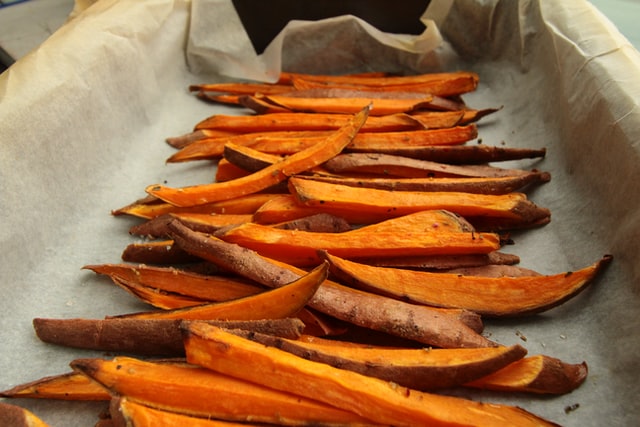
Photo by Louis Hansel @shotsoflouis on Unsplash
Rich in potassium and high in antioxidants- especially the skin, sweet potatoes are one of the most nutritionally dense foods per penny (or cent- I’ll stick with penny though as it sounds better).
Darker coloured varieties are even better. Replacing white potatoes with their sweet alternative keeps those calories, but adds the extra nutrients.
Calories per 100g
| Baked | 115 |
| Boiled and Peeled | 84 |
____________________________________________
12. Tempeh and Tofu
With meat no longer on the menu, not only is a foodstuff rich in calories no longer available but the variety of dishes on offer, particularly when dining out is also hugely reduced.
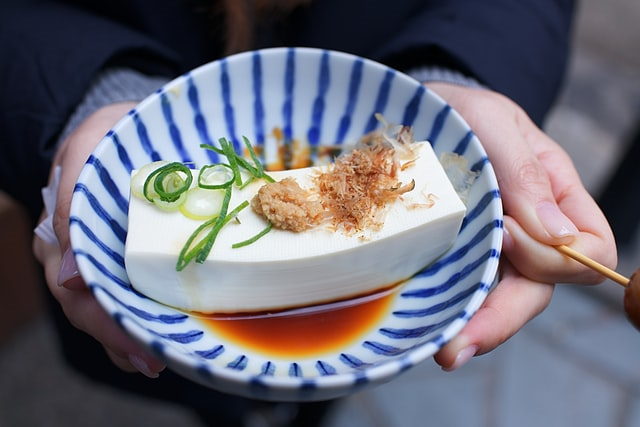
Plant-based Tempeh (made from fermented soybeans) and Tofu (derived from condensed soy milk)), can not only deputise admirably in the absence of meat, but they’ll add a calorific boost too.
Sure, they won’t provide quite as many calories, but neither will they clog up your arteries with cholesterol.
Additionally soy beans and food products derived from them are high in iron, magnesium, potassium, zinc, plus protein and fibre. Lovely.
Calories per 100g
| Tempeh (cooked) | 195 |
| Tofu (uncooked) | 73 |
| Tofu (fried) | 270 |
Note there are different varieties of tofu, but most seem to be around the 70 calories per 100g mark.
____________________
13. Seitan
Sometimes one may want to eat something that has the texture and general feel of meat, especially if, at the initial stages of veganism, one is tempted to once again resort to consuming just a little animal flesh, for the taste and texture, not just the calories.
Even more hardened vegans might fancy high calorie vegan foods of this nature now and again- something more substantial that leaves you feeling fully satisfied after eating.
“What the hell is it and how do you pronounce it?”
Yes, Seitan pronounced Say-tan, has been dubbed ‘Wheat Meat’ for a reason.
Even though it’s almost entirely made from wheat gluten, Seitan does a good job of looking and feeling like meat, taking on the guise of turkey, bacon, chicken, steak and more.
Although in itself, it’s nothing to write home about taste waste, Seitan can be cooked in a number of ways and can take on the flavours of whatever it is prepared with, making it very versatile.
It is high in protein and low in carbohydrates and fat, but being basically just gluten, should be avoided by those with an intolerance.
Make it yourself with wheat gluten, using a recipe like this or buy pre-prepared but be wary of additives and excess salt.
Calories per 100g:
| Seitan | 92 |
_______________________________
14. Dried Fruit
A high calorie vegan food that can be snacked on is hard enough to find, again if health is of primary concern. Those who suffer from nut allergies can find this problem even tougher.
Dried fruit could be the solution.
With a whole host of options available, dried fruits can be consumed on their own, mixed with nuts or added to cereals, vegan yogurts and cakes. Plus you get added fibre into your diet and those vital antioxidants.
Tip: Pick organic dried fruits to avoid sulphites/sulphur dioxide which are linked to inflammatory bowel disease.
Calories per 100g
| Deglet Noor Dates | 282 |
| Medjool Dates | 277 |
| Dried Figs | 249 |
| Dried Apricots | 188 |
| Sultanas | 273 |
| Raisins (Golden Seedless) | 302 |
________________________
15. Coconut
Dairy products can be quite a challenge to replace in a typical vegan diet- think milk, cheeses and desserts reliant on creams. Suddenly dropping these products can leave quit a gap to fill in terms of calories.
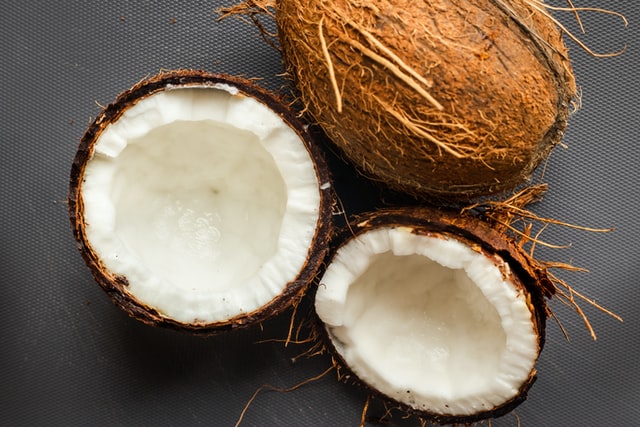
Coconuts and the increasing number of foodstuffs derived from them, act as able substitutes.
However, there are caveats with regards to health.
Coconut oils and milk although high in calories, may be detrimental to health and increase levels of bad cholesterol therefore should be consumed sparingly.
Coconuts as whole foods however are rich in Omega-3 fatty acids which are linked to the preservation of brain function.
Calories per 100g:
| Fresh | 351 |
| Milk | 230 |
| Cream | 350 |
| Dessicated | 604 |
_______________________________________
16. Dark Chocolate
Sweet snack foods for vegans that are little more on the indulgent side can be hard to find. And although fruit is clearly the better option, most won’t provide a high number of calories.
Dark chocolate isn’t for everyone, particularly those made from higher concentrations of cocoa, but it certainly ticks the high calorie/sweet box and in time, can replace milk chocolate for most, if not all, of your chocolate needs.
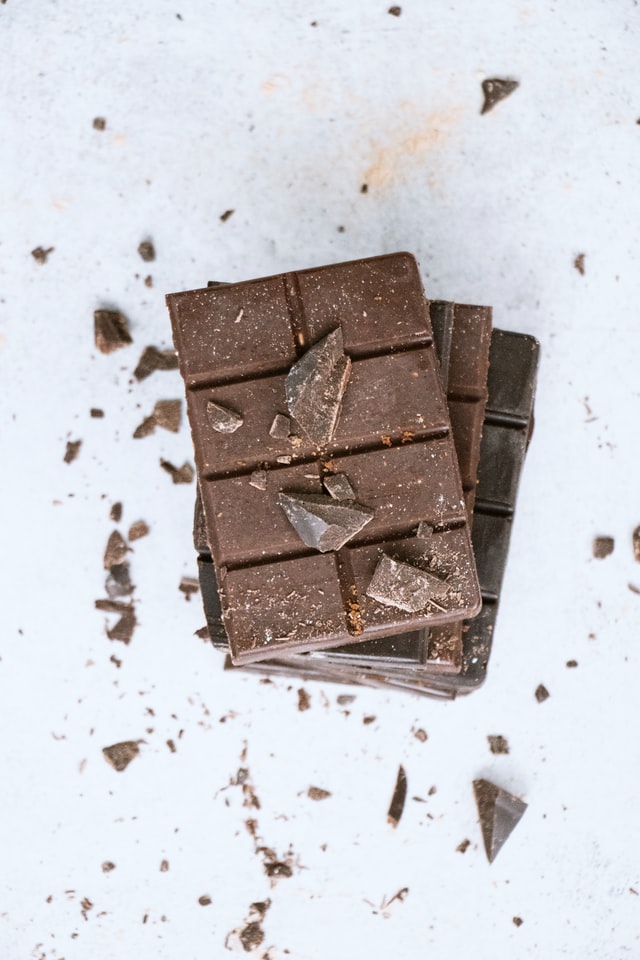
“Just because it’s vegan, it doesn’t mean it’s healthy,” is a mantra worth remembering and again this applies to dark chocolate, due to the fact it contains sugar and fat in the form of cocoa butter (which can actually raise cholesterol).
Having said that, dark chocolate contains around three times more anti-oxidants than the milk version, plus no cows get harmed.
Tip: Melt some dark chocolate and pour over medjool dates filled with peanut butter for an indulgent treat. It isn’t, but it feels like one.
Calories per 100g:
| 70% Cocoa | 351 |
| 85% Cocoa | 650 |
___________________________________________________________
17. High Calories Vegetables
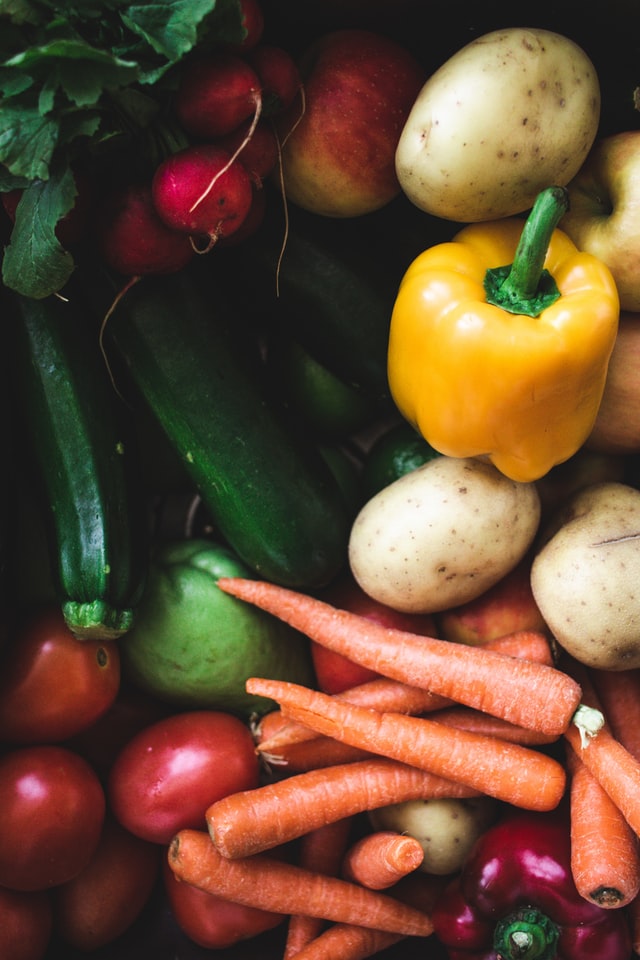
A vegan diet rich in vegetables, although beneficial health wise, is going to struggle to reach anywhere near what could be termed high calorie.
For those looking for weight gain or to maintain it whilst eating healthily, the following are high calorie vegetables so look to incorporate these into your diet where possible.
Calories per 100g:
| Parsnips (boiled or steamed) | 65 |
| Baked Potato | 97 |
| Potatoes (peeled, boiled or steamed) | 74 |
| Salad Potatoes (in skins, boiled or steamed) | 68 |
| Jerusalem Artichoke (boiled) | 41 |
| Acorn Squash (baked) | 56 |
| Sweet Corn (kernels, boiled from frozen) | 110 |
| Corn on the Cob (raw) | 54 |
_____________________
Junk Food
What if you want something quick, tasty, calorific and aren’t too fussed about nutrition?
Junk food has its place if these are the criteria to be fulfilled, and let’s be honest, junk foods are high calorie foods that can be hard to avoid or replace.
The vegan junk food market is growing rapidly with plant-based versions of ice cream, vegan chocolate (that isn’t just dark), desserts and pizza coming onto the market plus all the meat alternatives.
Clearly, these aren’t going to be healthy high calorie vegan foods, but if it’s calories that one is merely concerned with, then these options will do the job.
____________________
Summary
Hopefully I’ve gone some way to answering the question “What are high calorie vegan foods?”
It’s not easy working out how to gain weight as a vegan, especially if wanting to eat healthy (most of the time at least), appetising food.
The trick is to add as many of the above as possible to your vegan weight gain plan and if necessary, be creative when doing so, alongside eating increased portion sizes.
It’s trial and error really, and will take some determination, but you can get the best of both worlds.
_____________________
High Calorie Vegan Foods Resources
Nutritionfacts.org A great site packed with the latest nutritional information backed by science.
Caloriecontrol.org Search for the number of calories in food. Powered by the USDA National Nutrient Database.
NHS Calorie Checker Another calorie searching site, this time powered by Nutracheck.
Forks Over Knives A website dedicated to plant-based living. A review of the corresponding documentary can be found here.
______________________________________________________________________________
*This article is not meant as a substitute for expert dietary advice (unless they ask you where you get your protein from…). It’s always recommended you carry out your own research particularly if you live with allergies, co-morbidities or if you’re having drug treatment and seek expert advice where necessary. The links provided in the resource section of this article are good sources of nutritional and dietary information for those on a vegan or plant- based diet.
